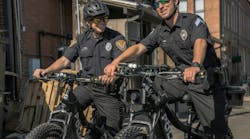Ask anyone with a badge to rate his or her officer safety, and you'll hear that they are at least "above average." Obviously, not everyone can be above average. Nonetheless, most cops ass-u-me they use sound tactics. After all, they've been doing whatever it is they do, and it's worked for them so far, right?
Some officers' hackles are raised at the mere suggestion they could have performed a particular task more safely. Oddly enough, these are usually the officers who would most benefit from a bit of sound tactical advice! These officers always seem to have a "scheduling conflict" that precludes them from attending firearms or defensive tactics training. Instead of honestly evaluating their performance, these officers simply rationalize their mistakes.
Any cop worth their salt knows it's not a matter of if but when we will be put to the ultimate test. Our performance in that critical moment when lives are hanging in the balance is heavily dependent on our training.
Officer Safety 101
In my department's Field Training Program, we use what are referred to as Standard Evaluation Guidelines (SEG) to rate a trainee's behavior in thirty-three performance categories. One of those, "Officer Safety: General" is designed to:
"Evaluate the trainee's ability to perform police tasks without injuring self or others and without exposing self or others to unreasonable danger or risk."
The following circumstances are specifically addressed:
- Exposes weapons (handgun, baton, mace, etc) to suspect.
- Fails to keep weapon hand free in enforcement situations.
- Stands in front of/next to violator's vehicle door.
- Fails to control suspect's movements.
- Fails to use illumination when necessary or uses it improperly.
- Does not keep violator/suspect in sight.
- Fails to advise Communications when leaving vehicle.
- Fails to maintain good physical condition.
- Fails to properly maintain personal safety equipment.
- Does not anticipate potentially dangerous situations.
- Stands too close to passing vehicular traffic.
- Is careless with gun and/or other weapons.
- Fails to position vehicle properly on car stops.
- Stands in front of door when making contact with occupants.
- Makes poor choice of which weapon to use and when to use it.
- Fails to cover other officers or maintain awareness of their activities.
- Stands between police and violator's vehicle on a car stop.
- Fails to search police vehicle prior to duty and after transporting other than police personnel.
Obviously, this is not an exhaustive list of the dangers associated with police work. Still, how many officers' lives could have been spared if they would have adhered to basic officer safety protocol each and every time they found themselves in one of the situations on our list?
Let's face it, we've all committed tactical errors that we're lucky didn't result in serious injury--or worse. If a cop who's worked for more than a few shifts tells you differently, they are either a liar or a fool!
How then do we develop the mindset and tactical skills to not only survive "routine patrol," but also actually thrive during the worst case scenario? How can we conquer the archenemy of every cop: complacency?
Training
Consider the following quote from the book Karate-Do My Way of Life, by Gichin Funakoshi, who is widely considered the father of modern Karate-do: "You must be deadly serious in your training. When I say that, I do not mean that you should be reasonably diligent or moderately in earnest. I mean that your opponent must always be present in your mind...
"You may train for a long, long time, but if you merely move your hands and feet and jump up and down like a puppet, learning karate is not very different from learning a dance."
Officers need to realize there's more to training than simply showing up and going through the motions. Too often, officers arrive at training without the proper frame of mind. Even before they've finished their coffee, they're wondering (either internally or aloud) when the class will break for lunch. After returning from lunch, these officers start looking at the clock and hoping the training will conclude before the designated time.
Remember how exciting it was to be a new officer and actually get paid to participate in firearms or defensive tactics training? I bet most of us would have done it for free! What happened?
The next time you're training in defensive tactics, envision being in a fight with a suspect. Don't hold back! Deliver each strike with the intent of stopping a suspect who is assaulting you. If you're training with this kind of intensity, it will be apparent to you and anyone else present. Even if you're in good shape, It won't take long to work up a good sweat and become short of breath.
I challenge you to learn or improve upon at least one technique or concept from each training session. Even if the material presented is something that you've been taught dozens of times before, there is always room for improvement. A seemingly minor detail could be critical to the successful application of a particular technique.
Performance
On the street, treat each alarm call or 9-1-1 call as if it were the "real deal." You know as well as I do there's a good chance the alarm was activated unintentionally by an employee, and that the 9-1-1 call was the result of a child playing with the phone. However, by treating each call as if it could be your last, you are reinforcing appropriate officer safety practices. Then when you respond to the 9-1-1 call that was (unbeknownst to you) made in reference to a man with a gun; you will simply approach the situation as you would any other--safely!
As you're strapping on your vest and duty belt in preparation for your next shift, remind yourself that today could be the day that your skills are put to the ultimate test. If you're not involved in a critical incident during this shift, be grateful that you've been given one more day to prepare!
Train hard. Stay safe!


